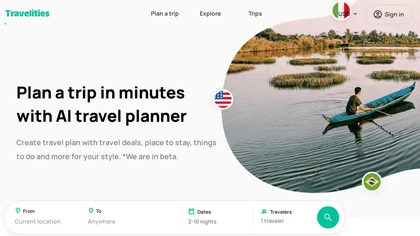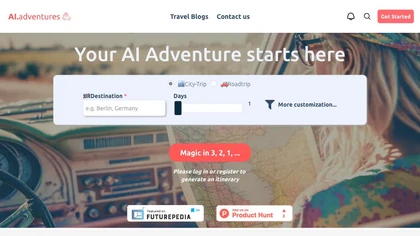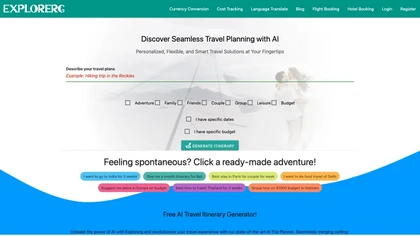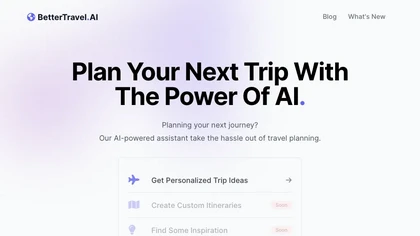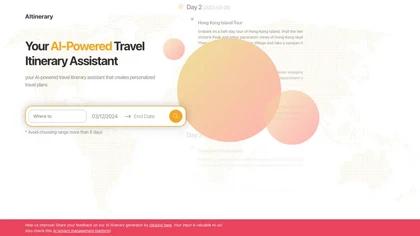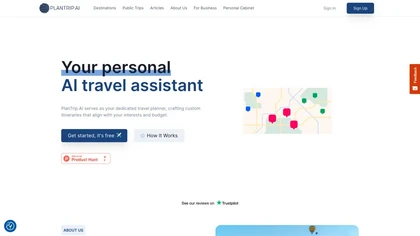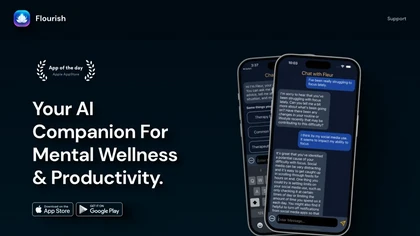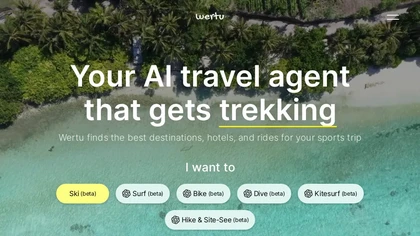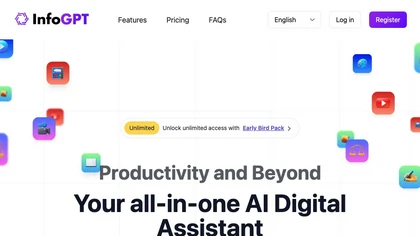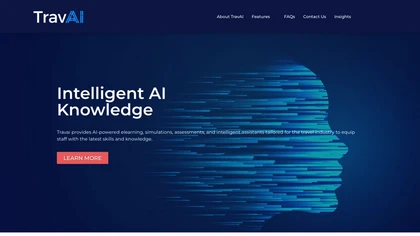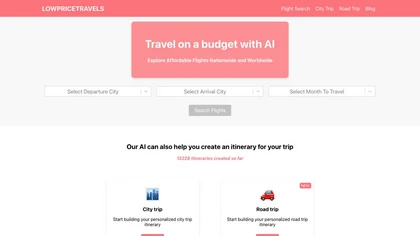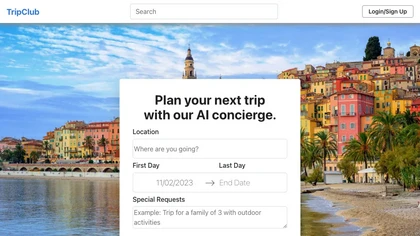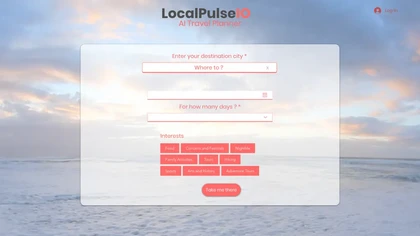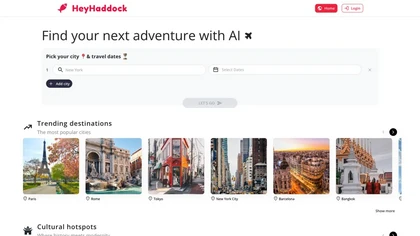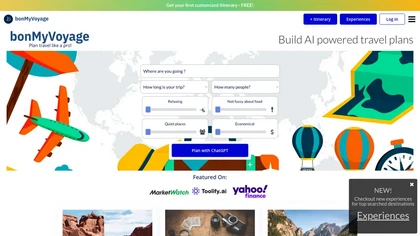AI use cases for Exploration
Generative AI can be applied in various applications for exploration. Here are some examples to explore below for inspiration with AI tools to get you started with using AI in exploration.
🛠️ 70 AI tools for Exploration
Explore a dynamic list of some of the most popular tools to get you started with various AI use cases and applications for Exploration to streamline your workflows and productivity today.
Well Me Right features
- AI matching and Health Coach capabilities
- Personalized coaching
- Dietary tracking, nutritional guidance
- Guided meditation sessions
- Adaptive health partner
Roam Around features
- Travel planning
- Customized travel plans
- Pet-friendly itineraries
- Budget-friendly trips
- Honeymoon itineraries
- Family-friendly itineraries
Travelities features
- Trip planning
- Personalized recommendations
- Travel deals
- Place recommendations
- Things to do
FreePlanTour features
- Travel itinerary generation
- Personalized travel guides
- Multi-language support
- User-friendly interface
- Subscription plans
Travopo features
- Travel planning
- Inspiration
- Flight search
- Hotel search
Travel Echo features
- Language translation
- Phrase learning
- Destination selection
- Primary language setting
- Cultural insight
Local Buddy features
- AI-powered travel planner
- Provides personalized recommendations
- Offers unique places to eat, landmarks to explore, and immersive activities
- Integrates with Google Maps for step-by-step directions
- Available on Android and iOS
🔥
Create your account, save tools & get personal recommendations
Receive a weekly digest of our handpicked top tools.
Unsubscribe anytime
MonteTravelo features
- Discover unique travel destinations
- Provide unusual accommodations
- Offer access to unique spas
- Guide thrill-seekers to adrenaline attractions
- Filter choices by continent
Travelnaut features
- Destination planning
- Trip itineraries
- Sightseeing guides
- Nightlife guides
- Insider tips
Travelplan features
- Destination selection
- Itinerary generation
- Travel preferences customization
- Language preference selection
- Friends sharing
SmartLifeSkills
4.8SmartLifeSkills features
- Interactive platform with AI chatbots
- Multilingual lessons with authentic accents
- Adjustable playback speed
- Advanced text-to-speech technology
- Custom quiz generator
AI adventures
1.8AI adventures features
- Generate personalized travel plans
- Offer options for city trips, road trips, and custom itineraries
- Use openai's gpt4 model
- Interactive travel blogs
Planit Earth features
- Generate personalized itineraries
- Cater to traveler's interests and budget
- Provide detailed itineraries
- Easily accessible through a link or pdf
My Travel Brain
1.6My Travel Brain features
- Plan travel
- Knowledge of travel destinations
- Answer questions about travel destinations
Nomadspot features
- Trip organization
- Create travel itinerary
- Personal map sharing
- Community sharing
- Ai-powered planner
Wonderplan features
- Personalized itinerary generation
- Customizable itinerary planning
- Real-time collaboration
- Trip feedback improvement
- Connecting with like-minded travelers
Travelicious features
- Personalization of city destination experience
- Integration of AI for itinerary creation
- Recommendations based on user preferences
- Input destination, dates, budget, and interests for tailored journey
- City guide with recommendations on places to visit, eat, and explore
Insightful features
- Provide personalized on-demand coaching
- Focus on specific needs
- Available anytime, anywhere
- Blog with latest insights on living a fulfilling life
- Accountability coaching to help young professionals reach full potential
Explorerg - Discover features
- Personalized itineraries
- Custom-made recommendations
- Currency conversion
- Language translation
- Cost tracking
MealMate
5MealMate features
- Plan meals
- Tailor dietary preferences
- Consider budget
- Adjust for time constraints
PlanTripAI features
- Trip planning
- Customized itinerary
- Personalized travel
- Generate based on interests
- Budget
Bettertravel features
- Generate personalized travel recommendations
- Customize itineraries based on user preferences and interests
- Assist with travel planning without extensive research
- Easily input budget and travel plans
- Provide tailored recommendations for a more enjoyable trip
FoodZilla.io features
- Recipe builder
- Meal planning system
- Nutrition reports
- Mobile app
- Secure messaging
Five Phrases features
- Language learning support
- Essential phrase teaching
- Audio output feature
- Native text options
- Localization support
EpicTopia AI features
- Life journey tracking
- AI-generated insights
- Tailored action plans
- Personalized chronicle on a timeline
- Detailed guidance
MyFit AI features
- Program generation
- Meal plan generation
- Saving programs
- Input personal data
Summer AI features
- Ai gps technology
- Personalized experience
- Walking and driving navigation
- Augmented reality discoveries
- Visually enhanced journey
Explorify features
- AI-powered
- Travel recommendation
- Personalized trip experience
- Curated recommendations
- Modify plans on the go
JourneyPlan features
- Destination selection
- Travel duration planning
- Budget planning
- Accommodation preference setting
- Activity and restaurant recommendation
AItinerary features
- AI-powered
- Creates personalized travel plans
- Meticulously plans each day
- Suggests activities and must-visit spots
- Provides suggestions for various experiences
GenixGPT - Travel AI features
- Personalized vacation suggestions
- Tailored travel planning
- Off-the-beaten-path destinations
- Remote and rugged landscapes
- Untouched beauty
FriendnPal features
- virtual one-on-one chats with therapists
- supports various African languages
- booking therapy sessions online
- ASMR sounds for relaxation and stress relief
- digital journal for mood tracking
Tripplanner.ai features
- Suggest potential destinations
- Receive personalized itineraries
- Suggest nearby restaurants and attractions
- Plan a trip without having to research destinations and activities for hours
PlanTrip features
- Custom itinerary planning
- Tailored recommendations
- Destination insights
- AI-generated itineraries
- Seamless journey planning
Flourish features
- Meaningful Conversations
- Psychology-based Mental Health Assessments
- Stress Relief Tools
- Productivity Tools
- Quality Mental Health Support
Plan My Trip ASAP features
- Custom itinerary planning
- Pre-made itinerary selection
- Top dining recommendations
- Top bar recommendations
- Top cafe recommendations
Wertu features
- Sports travel planner
- Custom vacation planner
Balm.ai features
- Personalized coaching
- Access to top experts
- 1-on-1 virtual sessions
- Tailored advice
- Convenient expert connection
Tripper Guide features
- Personalized travel guide generation
- Customization of trip details
- Access to over 100,000 expertly curated travel guides
- Budget-friendly options
- Exploration of off-the-beaten-path adventures
NutritionAI features
- Customized nutrition plans creation
- Tailored meal plans examples
- Focus on privacy and user control
- Installation at home
- Platform login feature for support and queries
YaatriAI by AasPass features
- Personalized travel itinerary
- Accommodation recommendations
- Activity suggestions
- Transportation options
Journeai features
- Build travel itineraries
- Recommend activities
- Assist with trip planning
- Help with destination selection
- Customize travel experiences
Nowy features
- Tailored visual itineraries
- Custom routes and maps
- Seamless booking
- Personalized recommendations
- Discover nearby gems
BurnBacon features
- Workout plans
- Customized meal suggestions
- Motivational support
- Fitness guidance
- Data-driven solutions
Talkface features
- 1-on-1 tutoring
- Personalized curriculum
- Language learning
- Fun and engaging
- Affordable solutions
- Eliminates need for unreliable tutors
- Available on android and ios devices
BodyGuru features
- Personalized wellness routines generation
- Tailored recommendations
- Free platform
- Upcoming features integration
- Developed by JBBAE
Beeyond AI features
- Voice-to-text conversion
- Art studio functionality
- Pdf document chatbot
- Social media optimization
- Travel planning assistance
- Nutritional recipe creation
- Book and movie research
- Productivity tools
- Legal assistance
- Multilingual support
- Organization and content categorization
- Up-to-date information access
Language Atlas features
- adaptive lessons
- flashcard usage
- speaking practice
- audio and video examples
- global community
Plan Quest features
- Visual timeline
- Objectives and key results (OKRs)
- Notion-like editor
- Reflection canvas
- Timeline visualization
TravAI features
- AI-powered eLearning
- Simulations
- Assessments
- Intelligent assistants tailored for travel industry
- Utilizes artificial intelligence for training course creation
Itair features
- Personalized itinerary generation
- Customized recommendations
- Instant itinerary creation
- Support for various interests and preferences
- Solo and group travel planning support
LowPriceTravels features
- Flight search
- Itinerary creation
- Personalized trip suggestions
- User-friendly platform
- Customized itinerary creation
Traivl features
- Create personalized itinerary
- Plan a trip to any destination
- Get personalized itinerary in less than 5 minutes
- Completely free
- Sample trips
AI Meal Planner features
- Generates personalized meal and workout plans
- Includes fitness chatbot support
- Provides recipes
- Tailored to user's goals and needs
- Pricing options available
TripClub features
- Interactive calendar
- Tailored trip planning
- Personalized vacation
TraveLandz features
- Personalized travel plans
- Real-time availability of hotels, attractions, and transportation
- Simplify the planning process for travelers
- Provide the best prices for hotels and activities through partnerships with travel agencies
- User-friendly interface allows for easy navigation and exploration of unique destinations
BabelOn features
- Trip organization
- Destination exploration
- Detailed trip planning
- Budget management
- Smart suggestions
Planfit - Personal Trainer features
- Personalized workout plans based on individual goals and fitness level
- Optimization of sets, reps, and weights for each exercise
- Detailed exercise guides with clear videos for proper form and muscle targeting
- AI trainer named 'Max' for tailored workouts, motivation, and support
- Progress tracking, muscle recovery monitoring, calorie burn tracking, and workout balance maintenance
Mymealplan features
- Generates personalized meal plans
- Curates a list of the best recipes from the web
- Easy-to-use app
- Caters to various dietary preferences
- Provides grocery list for easy shopping
Skoot features
- Customized itinerary planning
- Activity suggestions
- Restaurant recommendations
- Deal finding
- Budget considerations
Travelmoji features
- Generate personalized itineraries
- Recommend sights, activities, and accommodations
- Easy travel planning
LocalPulseIO features
- GPT trip builder partnerships
- Customizable trip itineraries based on interests
- User input for destination city
- Paragraph text input
- Theme customization
Lebenmaster features
- 3-step process for goal forecasting
- Daily progress logs
- Task management functionality
- Brainstats feature
- Support for executing tasks faster and efficiently
Lifesage features
- Health
- Wealth
- Wisdom
- Personal development
- Self-improvement
HeyHaddock features
- Trip planning assistance
- Personalized recommendations for popular destinations, cultural hotspots, best food spots, and beaches
- Collaboration features for creating travel plans with friends
- Generation of events and insights based on individual preferences
- Availability of heyhaddock team for step-by-step assistance
bonMyVoyage features
- AI-powered itinerary travel planner marketplace
- Customized travel plans creation
- Curated recommendations from verified users
- Tailored travel plans based on preferences
- Connect with verified locals for insider tips
Guidie AI features
- personalized recommendations
- plan and optimize itinerary
- real-time updates
- mobile app
- location discovery
Lejrr features
- Discover new travel destinations
- Provides insights and suggestions
- Chat with AI for travel ideas
- Connect with fellow travelers and locals
- Easy reimbursement for expenses
TripTrio features
- AI-powered travel planner
- Generates customized trip itineraries
- Personalizes itinerary based on user inputs
- Suggests recommended places to visit, activities, dining options
- Allows fine-tuning of itinerary and offline access


